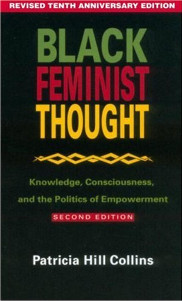Black Feminist Thought: Knowledge, Consciousness and the Politics of Empowerment
 |
|
| Author | Patricia Hill Collins |
|---|---|
| Language | English |
| Subject | Black feminism, women's studies |
| Publisher | Hyman |
|
Publication date
|
1990 |
| Pages | 384 |
| ISBN | |
Black Feminist Thought: Knowledge, Consciousness and the Politics of Empowerment is a 1990 book by Patricia Hill Collins.
Black feminist thought consists of ideas produced by Black women that clarify a standpoint of and for Black women. Several assumptions underlie this working definition. First, the definition suggests that it is impossible to separate the structure and thematic content of thought from the historical and material conditions shaping the lives of its producers (Berger and Luckmann 1966; Mannheim 1936). Therefore, while Black feminist thought may be recorded by others, it is produced by Black women. Second, the definition assumes that Black women possess a unique standpoint on, or perspective of, their experiences and that there will be certain commonalities of perception shared by Black women as a group. Third, while living life as Black women may produce certain commonalities of outlook, the diversity of class, region, age, and sexual orientation shaping individual Black women's lives has resulted in different expressions of these common themes. Thus, universal themes included in the Black women's standpoint may be experienced and expressed differently by distinct groups of Afro-American women. Finally, the definition assumes that, while a Black women's standpoint exists, its contours may not be clear to Black women themselves. Therefore, one role for Black female intellectuals is to produce facts and theories about the Black female experience that will clarify a Black woman's standpoint for Black women. In other words, Black feminist thought contains observations and interpretations about Afro-American womanhood that describe and explain different expressions of common themes.
Black women's insistence on self-definition, self-valuation, and the necessity for a Black female-centered analysis is significant for two reasons. First, defining and valuing one's consciousness of one's own self-defined standpoint in the face of images that foster a self-definition as the objectified "other" is an important way of resisting the dehumanization essential to systems of domination. The status of being the "other" implies being "other than" or different from the assumed norm of white male behavior. In this model, powerful white males define themselves as subjects, the true actors, and classify people of color and white women in terms of their position vis-a-vis this white male hub. Since Black women have been denied the authority to challenge these definitions, this model consists of images that define Black women as a negative other, the virtual antithesis of positive white male images. Moreover, as Britain and Maynard (1984:199) point out, "domination always involves the objectification of the dominated; all forms of oppression imply the devaluation of the subjectivity of the oppressed."
In spite of the double burden of racial and gender discrimination, African-American women have developed a rich intellectual tradition that is not widely known. In Black Feminist Thought, originally published in 1990, Patricia Hill Collins set out to explore the words and ideas of Black feminist intellectuals and writers, both within the academy and without. Here Collins provides an interpretive framework for the work of such prominent Black feminist thinkers as Angela Davis, bell hooks, Alice Walker, and Audre Lorde. Drawing from fiction, poetry, music and oral history, the result is a book that provided the first synthetic overview of Black feminist thought and its canon.
...
Wikipedia
